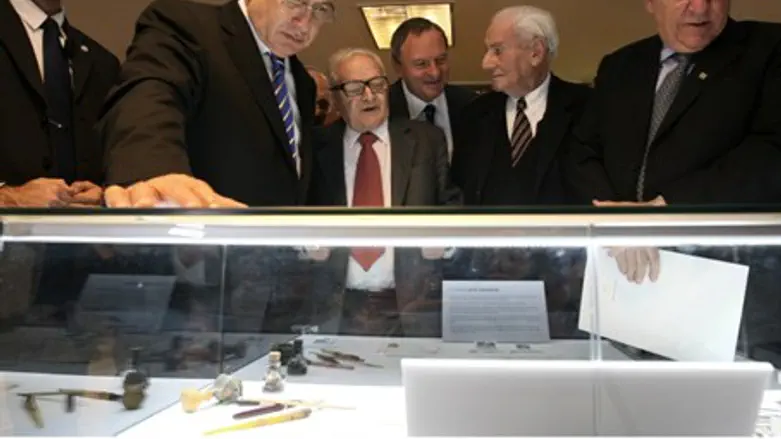
On Monday, the exhibit “Revealing the Operation to Capture Eichmann”, which marks the 50th anniversary of the trial of Adolf Eichmann, opened in the Knesset.
The exhibit presents documents from the State Archives and materials revealed by the Mossad for the first time regarding the operation to capture Eichmann in Argentina and bring him to trial in Israel.
Eichmann was assigned from the beginning to Nazi control of Germany, and later Europe, with finding an answer to the “Jewish question” - removing Jews from Europe, either by emigration or other means. Eichmann was the “Transportation Administrator” for the Final Solution and in charge of the trains that carried Jews to the death camps throughout Europe. He carried out his mission faithfully, continuing to move Jews to the gas chambers in the waning days of World War II.
After the war, Eichmann escaped from Germany using a series of fake identities and false passports. He was briefly held by American forces but managed to escape – eventually ending up in Argentina, where he lived in obscurity under the name “Ricardo Klement.” Israeli Mossad agents tracked down his whereabouts, and eventually arrested him and brought him to Israel.
Eichmann's trial began on April 11, 1961, and he was indicted on 15 criminal charges, including crimes against humanity, war crimes, crimes against the Jewish people, and membership in an outlawed organization. The trial struck a strong emotional chord among Israelis and Jews around the world, as many Holocaust survivors testified at the trial – telling personal histories of suffering and torture that many had not shared since being liberated from the death camps.
On December 11, the three judges presiding at the trial - Moshe Landau, Benjamin HaLevy, and Yitzhak Raveh – declared Eichmann guilty and sentenced him to death, the first and so far only time that a criminal has been sentenced to be executed in Israel. His sentence – death by hanging – was carried out on May 31, 1962. His body was cremated and his ashes spread over the Mediterranean Sea.
The items in the exhibit include Prime Minister David Ben-Gurion’s statement about the capture of Eichmann, the verdict and sentencing from his trial, the glass booth in which he was held and the passports used by the Mossad team.
"It is a very unique exhibition because it's the first time any documents or tools used by the Mossad are exposed to the public eye," said Naomi Yitzhar, the exhibit's historian councilor. "It's extremely important, not only because it's the first time but because it deals with Eichmann's capture and his trial in Israel."
"We see some of the documents used to identify Eichmann as well as the camera and some pictures," she added. "We can see the tools that the group of Mossad agents who captured Eichmann brought with them to Argentina. We can also see all the documentation that was prepared in order to take Eichmann out of Argentina, we can see the legal documents of the trial, and finally the spreading of his ashes outside Israeli territorial waters."
The exhibit will be open to the public who comes to visit the Knesset for three weeks, after which it will be moved to the Beit HaTfutsot (Diaspora) Museum in Tel Aviv for three months.